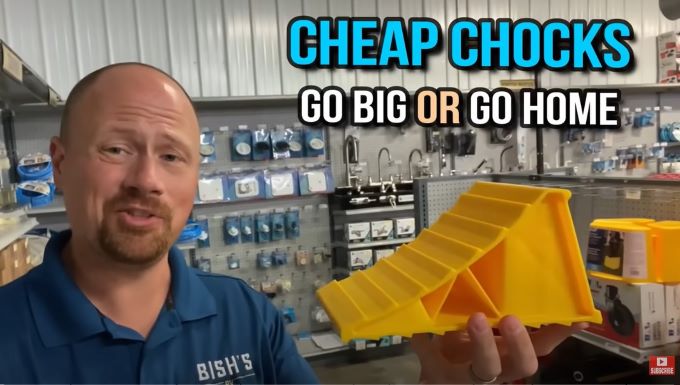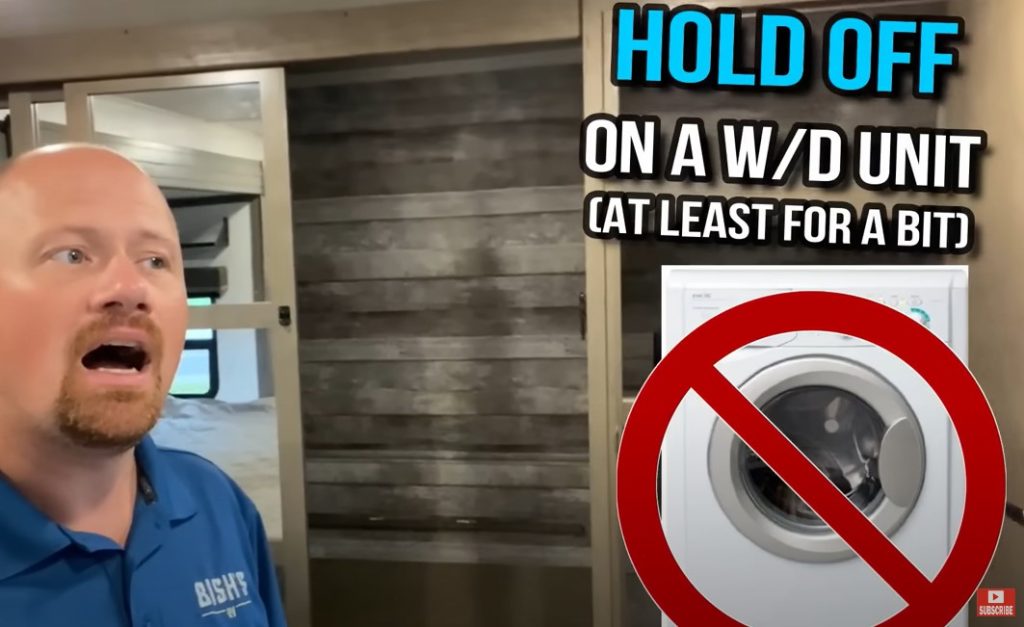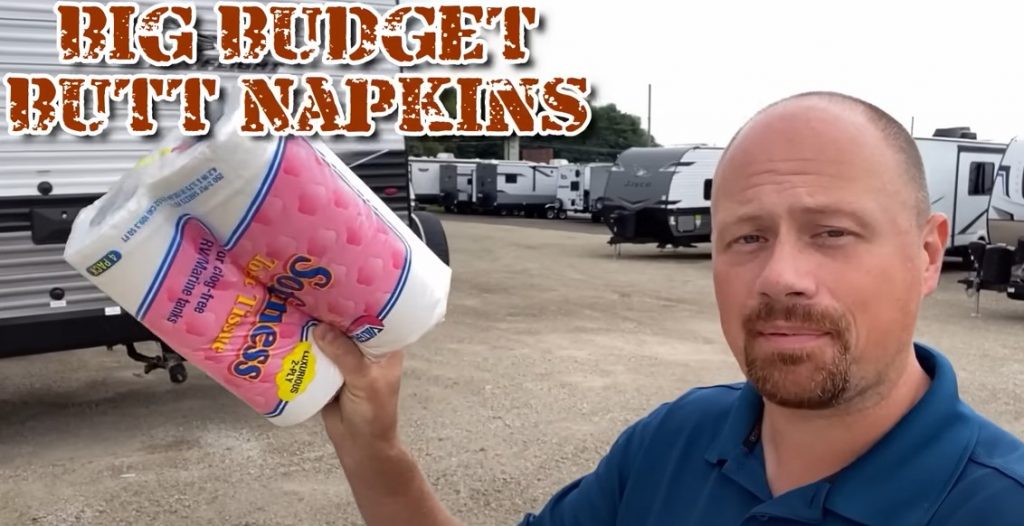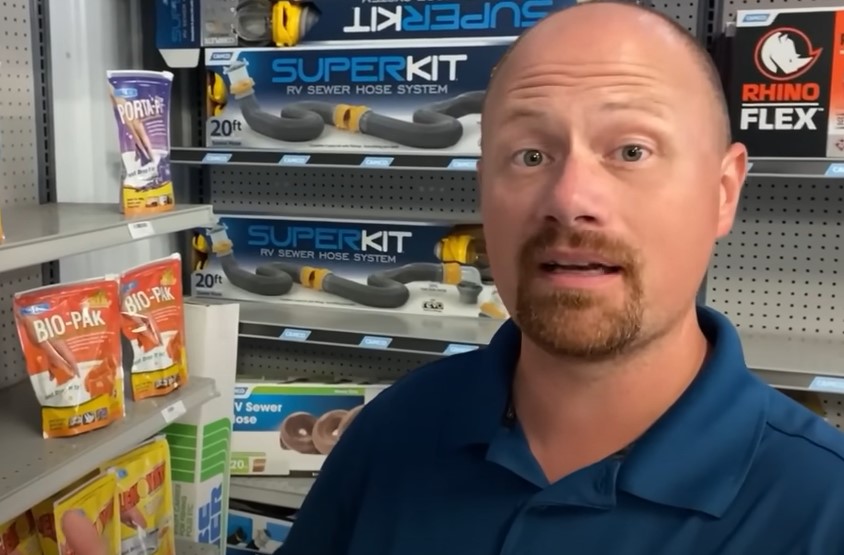How often have you bought something you later replaced or never used? Go ahead, raise your hand, we promise not to judge. We’ve all been there. Just last week I bought a shirt and after just one wash (one!) it became completely unwearable. To say I wish someone had warned me beforehand would be, well, it would be absolutely 100% true.
Buying RV parts or accessories gets far too expensive for preventable errors, especially when those errors can cause thousands of dollars in damage to your RV. Whether you’re buying your first RV and asking what you really need for an RV or you’re a seasoned RVer trying to get it right, let us save you from a little extra pain in the wallet.
Here is our list of 7 RV parts to buy, avoid, or wait and see on:
1. Quality Rubber Wheel Chocks: Yes

Cheap, lightweight, plastic wheel chocks can decay and are not worth your money. Skip the cheap chocks and instead buy a set of heavy duty, rubber wheel chocks. Rubber wheel chocks usually accommodate wide stance axles, come connected so you don’t lose them, and they don’t wiggle loose nearly as much as plastic chocks.
You may want to consider using X Chocks, depending on your budget and needs. X chocks are X shaped wheel stabilizers that go between the tires on a double/triple axel camper, clamp against the tires themselves, and are to be used with chocks (preferably the previously mentioned, heavy-duty rubber chocks).
2. Washer/Dryer: Maybe

Waiting until you’ve gone on a few camping trips before you decide to install a washer/dryer combo in your RV can save potentially save you money and storage space. This upgrade can end up being very expensive and underutilized for many RVers, especially if the RV is mainly used for shorter trips. After a few loads of laundry, you just might realize an RV washer/dryer has a long run time, low capacity, and places a heavy demand on your fresh water and grey holding tanks.
If you decide you want a washer/dryer in your RV, it can always be installed later, so a “try before you buy” approach is wise.
3. RV Toilet Paper: Yes

The last thing you need is a problem with your black tank. We just don’t want that for a quality individual like yourself. Buying toilet paper that’s safe for your RV can prevent unpleasant issues. You can buy specific RV toilet paper—but it isn’t always necessary—so long as it is labeled quick dissolve or septic safe. TP takes plenty of water to break down, so you also don’t want to skimp on water when you flush that precious RV potty.
4. Slide Out Awnings: Maybe

Give a good deal of thought to where you will park your RV and proceed to consider awnings for your slide out accordingly. In areas with low winds, light rains, and lots of trees, slide out awnings could prove very handy. High winds and heavy rains may make having slide awnings more trouble than the benefits are worth. If your RV doesn’t already come equipped with slide out awnings, go ahead and give camping without them a test run before spending the money, since, like the washer/dryer, you can always install awnings later.
Slide-out awnings can shade your slide out, keeping it cooler. If you’re camping at a site with a lot of trees, an awning can protect your slide out from any falling debris, just like an umbrella could protect you from any birds who have something against your toupee. (Just for the record though, I think your toupee is fabulous and looks very natural.)
Large slide out awnings can collect water and start to bow if there is a heavy rainstorm. You’ll need to drain the slide all the way before retracting it back into the RV. You can’t expect the water to flow away as you pull the slide back in. Water left on the slide can pull on the normal slack in the awning roll and cause issues. Slide-out awnings in the rain can be a major hassle.
High winds at your campsite can also cause the awning to slap the slide out, which could tear the awning or cause damage to roof membranes—depending on the style of your RV.
5. Disposable, Plastic, or Metal Dishware: Yes

Ahhh, who doesn’t love the sound of glass or ceramic breaking as you hit a bump on the freeway?
Oh, that’s right. Everyone.
Corelle dishware can be a suitable reusable option, and using rubberized shelf liners can help prevent sliding, but in general skip the breakable dishware unless you’re willing to tenderly wrap your items for safe transport, or you’re willing to risk the breakage.
6 – Slide Supports: No

Slide supports are exterior rods with platforms for bracing under your slide when it’s fully extended. RVs built in the last 20 years are not built to require these. (Nice work manufacturers, thanks for doing us RVers a solid.)
Adding slide supports under your slide can even cause the slide to move in an unnatural manner separate from the RV’s natural wiggle. Unnatural wiggling and jiggling can cause gaps and compressions in the slide seal. This activity in the seal negatively impacts its integrity and can lead to a water leak, since the slide needs to be kept square to the body of the unit to function as intended.
Check out Josh the RV Nerd’s other videos USE CAUTION with Your RV Slides and Comparing RV Slide Out Systems.
7 – High-Quality Sewer Hoses and Black Tank Treatment: Yes. For all that is good and holy, yes.

Listen up. This is not where you want to save money. RV experts and seasoned RVers agree, never buy the cheapest sewer hose available, unless you want to regret your life choices. And if that’s what you want, well, you have a different set of problems and we’re here to talk about RV parts, okay?
More expensive, higher-quality hoses hold their shape better and are more crush resistant if they happen to get stepped on. We recommend owning two, just in case one fails, or you need the extra length.
While you’re at it, always buy good-quality black tank chemical treatment. This will keep the smell down and ensure your black tank is breaking all that . . . business down correctly. Don’t go off label here, always read and follow the directions for the proper amount to use for your tank capacity.
When RVing, there are some things you can skimp on, some you can skip, some things you should never buy, and some items you are better off paying extra for. Hopefully this list of 7 parts to consider saves you some money, prevents unnecessary repairs, and prevents you from buying accessories you won’t need or use.
